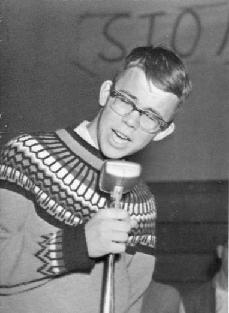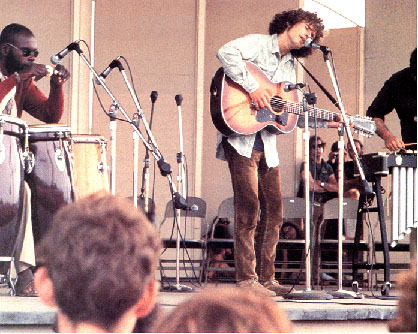| With
hindsight, Underwood traces Buckley's depressive
tendencies to his father who "suffered a head injury in
the Second World War, and from then on his insecurities and
rage made life miserable for Tim. He saw Tim's beauty, and called
him a faggot and beat him up. He looked at Tim's talent and
said he'd never make it.
His
mother didn't help : she'd tell him he'd die young because that's what poets always
did. So he grew up deeply hurt and feeling inadequate, yet driven by this extraordinary
musical talent that possessed him." The result, Underwood ventures, "gave
Tim a deep-seated fear of success...he wanted people to love him but, as they
did, he pushed them away." "Long
after his death," says Beckett, "I realized that there were very few
songs he wrote that didn't have the word 'home' in them. It seemed like he felt
homeless, and nothing would restore it. He seemed OK in high school, maybe a little
wild, but he got increasingly neurotic. He'd almost welcome a negative comment
that would reaffirm his feelings." When,
in 1970, Jerry Yester's wife Judy Henske poked fun at the line "I'm as puzzled
as the oyster" in the majestic Song To The Siren, Buckley instantly
dropped the song from the set. "He took the smallest criticism to heart,"
says Larry Beckett, "so that he couldn't even perform a song which he admitted
was one of his all-time favorites!" 
Songwriting
partner and one quarter of The Bohemians - Larry Beckett at Loara High |
Another
incident stands out from this period. Tim's choirboy looks and froth of curls
had attracted a Love Generation-style teeny-bop following. At a show at New York
Philharmonic Hall, his most prestigious to date, various objects were thrown on
stage, a red carnation among them. Buckley stooped down, picked it up and proceeded
to chew the petals and spit them out. "He
was very vulnerable and emotional," says Beckett's ex-wife Manda. "It
made him terribly attractive to everybody of both sexes. People just sort of swooned
around him because he was so sweet. I think that frightened him. He was difficult
to deal with because he was scared of his power over people. He almost seemed
to reject his audiences for loving him so much. He wasn't mature enough to accept
that kind of attention." Tim
would also embroider the truth. At school he'd lie about playing C&W bars,
while Larry Beckett remembers dubious boasts of female conquests. Buckley also
claimed to have played guitar on The Byrds' first album, which Roger McGuinn always
denied. "Tim liked to feed the legend," Beckett recalls with a wry chuckle.
"He was quite amoral -- if a lie gave a laugh or strengthened his mystique,
that was fine. But his music was always honest." "If
someone dared him to do something, he'd do it," recalls British bassist Danny
Thompson, who accompanied Buckley on his 1968 UK visit. "This free spirit
was what most people saw, but I also saw a bit of a loner. Unlike most people
who get into drugs, he wasn't a sad junkie figure. He was more of a naughty boy
who said, 'OK, I'll have a go, I'll drink that.'" If
he admired Hendrix and Hardin and Havens, Buckley frequently railed against the
rock establishment. "All people see is velvet pants and long, blonde hair,"
he fumed. "A perfect person with spangles and flowered shirts -- that's vibrations
to them." "He
viewed the blues-orientated rock of the day as white thievery and emotional sham,"
says Underwood. "He criticized musicians who spent three weeks learning Clapton
licks, when Mingus had spent his whole life living his music." Retreating
to his home base in Venice, LA, Buckley and Underwood took time out to immerse
themselves in the music of the East Coast jazz titans. Miles, Coltrane, Monk,
Mingus and Ornette Coleman all provided inspiration as rehearsals slowly metamorphosed
into jam sessions. The day before playing New York's prestigious Fillmore East
theatre, Buckley asked vibraphonist David Friedman to rehearse for the show. Seven
hours without sheet music later, a new sound was born. With
Happy/Sad (1969), Buckley began to arc away from the underground culture that
had launched him. New York photographer Joe Stevens, a good friend of Buckley's
at the time, recalls the singer's suspicious attitude towards the forthcoming
Woodstock festival. "He said, 'Are you really going? Oh, man, it's going
to be awful.' Yet we used to hang out on a friend's farm which was like a scaled-down
Woodstock, with hippy girls walking around, weird food, drugs, freedom and trees."
Although
Jerry Yester was again involved, Happy/Sad was the polar opposite to Goodbye
& Hello's crowded ambition : spacious, supple, a sea of possibilities.
The line-up was just vibraphone, string bass, acoustic twelve-string, and gently
rippling electric guitar. "The Modern Jazz Quartet of Folk," enthused
vibraphonist David Friedman. "Heart music," Buckley offered, and Elektra
used his words in the ads like a manifesto. Happy/Sad's only real comparison
is Astral Weeks, a similarly symmetrical, fluid work that revels in its
lack of boundaries while possessing a unique tension. "The
trick of writing," Buckley felt, "is to make it sound like it's all
happening for the first time. So you feel it's all happening for the first time.
So you feel it's everybody's idea." 
©
Elliot Landy/Landyvision.com
'The Modern Jazz Quartet of Folk' at the Newport Folk Festival, Newport, Rhode
Island, 1968 with percussionist Carter Collins (left) and half of David Friedman |
Van
Morrison, Laura Nyro and John Martyn were also melting the walls between rock,
blues, folk and jazz; at twenty-two, Buckley was the youngest of the bunch. He'd
also caught the jazz bug the hardest. Yester revealed that the band resisted second
takes, while Strange Feeling was bravely anchored to the bass line of Miles
Davis's All Blues before Buckley's voice set sail, caressing and cajoling.
"Being
with Tim was like going out with an English professor," recalls Bob Duffy,
Buckley's tour manager at the time. "He was very serious and almost stodgy,
exactly the opposite of what you'd think a rock star would be. He wasn't in the
music business to get laid. If one of the guys in the band came up and mentioned
women, thirteen of them would run out of the room, except for Tim who just sat
there, guitar in hand, almost like he was teaching himself the songs again even
though he'd played these songs two hundred times, because he wanted the show to
be as musically performed as possible. I saw incredible shows that he got depressed
about, and wouldn't talk to anyone afterwards -- he was very Zappa-like in that
demanding way, but he was one of the sanest people on that level that I worked
with." As
its very title acknowledged, despite Happy/Sad's sun-splashed backdrop,
musical invention and lyrical joie de vivre, its mood was acutely introspective.
Critic Simon Reynolds has described it as "a poignant premonition of loss,
of an inevitable autumn..." Lyrics
had clearly shifted to a secondary, supportive role. Larry Beckett says he was
politely informed that the singer would pen the lyrics alone. "He was moving
toward a jazz sound, so to have wild poetry all over the map, you'd miss the jazz.
But it was my feeling too that Tim felt his success was due to my lyrics rather
than his music, so he wanted to see how well he'd do alone. He tended to believe
the worst about himself..." "It
was very hard for me to write songs after Goodbye & Hello, because
most of the bases were touched," Buckley admitted. "That was the end
of my apprenticeship for writing songs. Whatever I wrote after that wasn't adolescent,
which means it isn't easy because you can't repeat yourself. The way Jac [Holzman]
had set it up you were supposed to move artistically, but the way the business
is you're not. You're supposed to repeat what you do, so there's a dichotomy there.
People like a certain type of thing at a certain time, and it's very hard to progress."
In another
interview Tim said, "I can see where I'm heading, and it will probably be
further and further from what people expected of me." "He
was very friendly and open to ideas, not a prima donna or a hypocrite," recalls
John Balkin, who played bass with Buckley in 1969-70. There was no drugs, sex
and rock'n'roll in relation to him as an artist, not like Joplin and Hendrix,
getting stoned before and during a gig. He felt stifled and frustrated by the
boundaries that be, trying to stretch as an artist but making a living too. I
remember Herbie Cohen saying, 'Go drive a truck then'..."
|